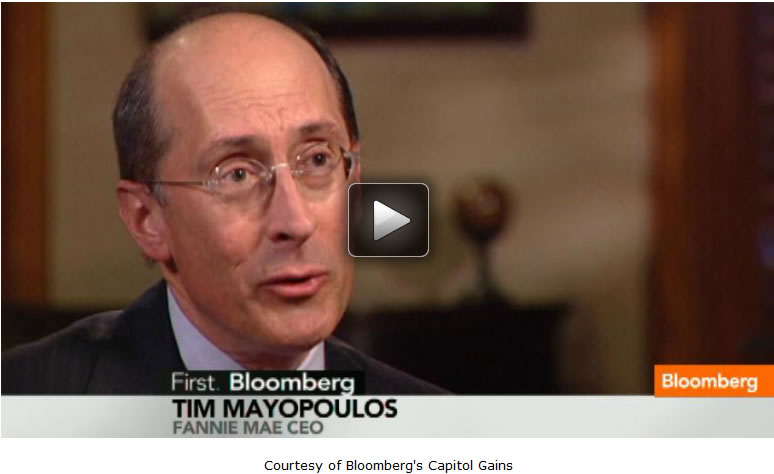U.S. Taxpayers Could Profit from Fannie Mae Bailout
Companies / Credit Crisis Bailouts Apr 12, 2013 - 10:31 AM GMTBy: Bloomberg
 In his first TV interview since the company reported record profits, Fannie Mae CEO Tim Mayopoulos told Bloomberg TV's Peter Cook today that U.S. taxpayers could see a net gain from their bailout as the housing market rebounds. Mayopoulos said, "I do think, given the strength of our future profitability, that it is possible that we will be able to pay dividends that would be equal to or greater than the amount of money that we've received from the Treasury Department."
In his first TV interview since the company reported record profits, Fannie Mae CEO Tim Mayopoulos told Bloomberg TV's Peter Cook today that U.S. taxpayers could see a net gain from their bailout as the housing market rebounds. Mayopoulos said, "I do think, given the strength of our future profitability, that it is possible that we will be able to pay dividends that would be equal to or greater than the amount of money that we've received from the Treasury Department."
Mayopoulos also said, "There is a risk that policymakers will look at our profitability and say we don't need to act on this soon. I think that would be a mistake. There needs to be clarity about what the future of the housing finance system is going to be."
Catch the full interview this Sunday on "Capitol Gains," airing at 11:30 am ET on WUSA9 in Washington and nationally on Bloomberg Television at 12 pm and 5 pm ET.
Mayopoulos on Fannie Mae's turnaround:
"We are obviously pleased with the turnaround and from our perspective. This is not something that miraculously came upon us. This is the result of four plus years of work that we've been doing at Fannie Mae. We've really been very focused on building a new book of business that will be profitable. We've been managing the legacy book to minimize losses and we've been focused on pricing appropriately for the risk that we take. While it probably seems like a very sudden turnaround to those outside the company, for those inside the company we've been working on this for years to try to get to this place."
On whether the profits are sustainable over the long-term:
"We do think that we will have strong profits for the foreseeable future. The degree of confidence about that varies the farther out you go because we can't predict the future years out, but for the next few years we expect clearly to be profitable."
On whether taxpayers could earn a profit on their investment in Fannie:
"We are paying substantial dividends to taxpayers, so the company received payments from the Treasury of $116 billion. So far we have paid dividends in excess of $35 billion. I do think, given the strength of our future profitability, it is possible that we will pay dividends that will be equal to or greater than the amount of money that we have received from the Treasury department."
On whether the debate for the government to replace Fannie Mae will happen sooner rather than later:
"I'm not sure if it will happen sooner rather than later. I do think there is a risk that I think people should not accept, but there is a risk that policymakers will look at our profitability and say we don't need to act on this soon. I think that would be a mistake. There needs to be clarity about what the future of the housing finance system is going to be. I think the sooner we get there, the sooner private capital is likely to come back to this market."
On whether the reality is that the better Fannie Mae does, the sooner it goes away:
"That's one possibility. I think what our return to profitability does is allow policymakers to think about a full range of potential outcomes. They don't have to start with the assumption that creating some successors to Fannie and Freddie necessarily means that we have to accept hundreds of billions of dollars of losses for taxpayers. I do think the taxpayers may well receive their money back. I think what this has done is freed policymakers to think about what the full range of possibilities should be. There is a lot of debate about that, but I think the key is getting to an answer in the foreseeable future because no matter what you think the future housing finance system should look like, everybody agrees that at the moment the taxpayer shouldn't be on the hook for 90% of the market. Between Fannie, Freddie and FHA, the taxpayers are guaranteeing 90% of all the mortgages that are being written across the country. That doesn't make sense no matter what you think the future of the housing finance system should look like."
Copyright © 2013 Bloomberg - All Rights Reserved Disclaimer: The above is a matter of opinion provided for general information purposes only and is not intended as investment advice. Information and analysis above are derived from sources and utilising methods believed to be reliable, but we cannot accept responsibility for any losses you may incur as a result of this analysis. Individuals should consult with their personal financial advisors.
Bloomberg Archive |
© 2005-2022 http://www.MarketOracle.co.uk - The Market Oracle is a FREE Daily Financial Markets Analysis & Forecasting online publication.




